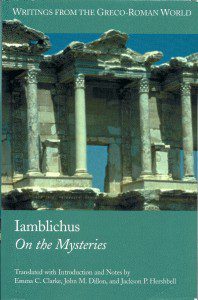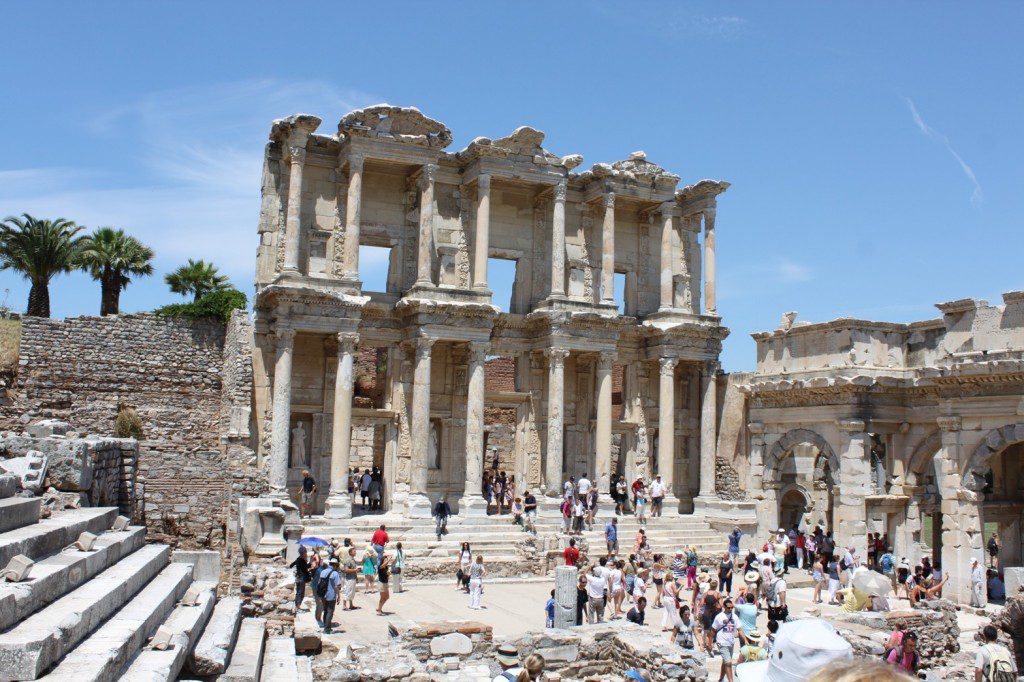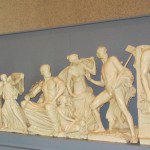 I recently finished reading De Mysteriis, written by the Greek Iamblichus somewhere between 280 and 305 CE and translated by Emma Clarke, John Dillon and Jackson Hershbell in 2003. According to the translators:
I recently finished reading De Mysteriis, written by the Greek Iamblichus somewhere between 280 and 305 CE and translated by Emma Clarke, John Dillon and Jackson Hershbell in 2003. According to the translators:
Iamblichus was essentially interested in re-awakening and preserving man’s contact with the ancestral gods, and in arguing that theurgy (or “god-work”) rather than theology (or “god-talk”) was the only way of achieving this.
Iamblichus’ ideas about the gods are very hierarchical: he describes tiers of immaterial gods, material gods, angels, daemons, heroes and souls. Each tier is superior to the tier below it: less physical and more intellectual and therefore closer to perfection as he saw it. I’m really not qualified to critique his theology other than to say that as a modern Pagan, my thoughts are rather different.
What I find interesting and worth blogging about are his thoughts on prayer. Many Pagans and other religious liberals struggle with prayer; questioning its need, its effectiveness, and generally turned off by the immature attitude many take toward prayer (“God Gimme!”). But prayer is one of the cornerstones of my spiritual practice, and I’m always interested in others’ thoughts on it.
In Book V of De Mysteriis, Iamblichus described three “degrees” of prayer:
I declare, then, that the first degree of prayer is the introductory, which leads to contact and acquaintance with the divine; the second is conjunctive, producing a union of sympathetic minds, and calling forth benefactions sent down by the gods even before we express our requests, while achieving whole courses of action even before we think of them; the most perfect, finally, has as its mark ineffable unification, which established all authority in the gods, and provides that our souls rest completely in them.
Like any conversation, prayer begins with an introduction. Our gods and goddesses frequently have multiple titles and we tend to address them all. We want to be polite when we call our deities, but let’s not get carried away – they know who they are and they aren’t so insecure they have to be constantly reminded of how great they are. If the introduction is enough for us to recognize who and what we’re talking to, it’s enough.
What if you don’t know who you’re addressing? What if you’re just starting out and you’re still not sure about this polytheism thing? What if you’re not sure there are any gods or goddesses to begin with?
While it’s important what you believe, it’s more important what you do. If you don’t know who to pray to, just pray. Introduce yourself – and then listen. Open yourself to that which is greater than us and don’t worry about who or what that is.
Secondly, Iamblichus says prayer produces “a union of sympathetic minds.” When we pray to the gods we form a connection that flows both ways. Our thoughts and desires and devotion flow to the gods, while their essence flows back to us. The skeptical among us may be reluctant to acknowledge “benefactions sent down by the gods” and “achieving whole courses of action,” but this is only a problem if we pray with the expectations of a four-year-old in a toy store. Prayer aligns our will with the will of the gods and gives us a glimpse into the divine perspective on Life.
Or, to quote 19th century philosopher Søren Kierkegaard, “Prayer does not change God, but changes him who prays.”
And thirdly, prayer “has as its mark ineffable unification.” The more we pray, the more we are changed, the more we are imbued with the essence of the gods (or more precisely, with the essence of the gods to whom we pray), and the more god-like we become.
Iamblichus goes on to enumerate the benefits of prayer:
Extended practice of prayer nurtures our intellect, enlarges very greatly our soul’s receptivity to the gods, reveals to men the life of the gods, accustoms their eyes to the brightness of divine light, and gradually brings to perfection the capacity of our facilities for contact with the gods, until it leads us up to the highest level of consciousness … and, in a word, it renders those who employ prayers, if we may express it, the familiar consorts of the gods.
For all the benefits he saw in prayer, Iamblichus apparently thought little of the informal, spontaneous and heart-felt prayers that many of us are familiar with. He believed certain words and formulas were effective and others were not. In Book VII he said:
It is necessary that the prayers of the ancients … are preserved ever the same and in the same manner, with nothing of alternative origin either removed from or added to them. For this is the reason why all these things in place at the present time have lost their power, both the names and the prayers: because they are endlessly altered according to the inventiveness and illegality of the Hellenes.
While I agree with Iamblichus that proven methods should be continued (at least until they are changed on purpose and for good reason), this hasn’t been my experience. I’ve had great response from modern prayers. They are not the most poetic, most articulate prayers I’ve ever prayed, but they express the desires of my heart and the yearnings of my soul.
I’m a Druid, not a Hellenist. Most of my exposure to Greek paganism comes from the older stories of their gods, not from the later philosophers. But while Iamblichus’ hierarchy of the gods strikes me as unlikely, I find great wisdom in his thoughts on prayer.
It remains, therefore, at the end of this discourse, for me to pray to the gods to grant both to me and to you the unalterable preservation of true thoughts, to implant in us the truth of eternal things forever, and to grand to us a participation in the more perfect conceptions of the gods in which the most blessed end of good things is placed before us, along with the sanction of the harmonious friendship between us.
May it be so.

















